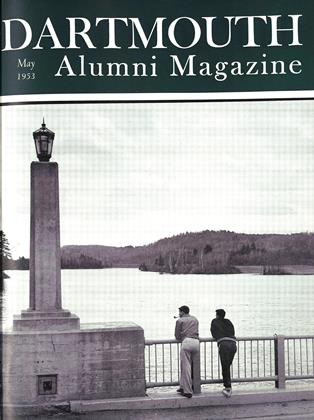THIS month I have a variety of books to chat about which should please almost any taste.
For the scholar, or person interested in the Middle Ages, I strongly recommend the purchase of The Shorter CambridgeMedieval History (in two volumes) by C. W. Previté-Orton. This was published in England by the Cambridge University Press, and here by Macmillan Company. The illustrations, of which there are 300, are especially good. The text is condensed wondrously well by Mr. Previté-Orton, who died before his task was finished, and Mr. Philip Grierson who took it over, from the eight large volumes of the CambridgeMedieval History. A solid, substantial, and great work.
There is also for the scholar or interested reader a new edition of Selections From theNotebooks of Leonardo da Vinci, edited with commentaries by Irma A. Richter. This is an Oxford World's Classic, and well worth the small price asked for it. The beauty of nature and also "the spirit at work beneath the world of appearance that fascinated him" are revealed in many facets of Leonardo's life and career. This book will fascinate you.
If you want a one-volume book on modern astronomy I can recommend a new book, Astronomy For Everyman, edited by Martin Davidson, and issued by Dent in England, and Dutton here in America. The object of this work is to explain in popular form the methods, instrumental equipment, aims, and results of the astronomer. It covers every branch of the subject in twelve sections written by different authors, each a specialist in his own particular branch. There are many photographs and diagrams.
Another important book which you may have missed, and this is for those who like biography, is Jeannette Mirsky and Allan Nevins' book The World of Eli Whitney, published by Macmillan in 1952. The basis of this important, and only modern study of Whitney, is the hitherto unpublished collection of family papers. Wherever possible, Whitney's personal story his dealings with Stiles, Jefferson, and Fulton, his relationship with the fascinating widow of Nathaniel Greene, his marriage to a granddaughter of Jonathan Edwards -is told in his own words. Whitney did much more than invent the cotton gin in 1793. He is, in his pioneer activity in tools, machines and methods, the predecessor of Colt, Singer, McCormick, and Henry Ford.
For those who like sea stories, in this case a true one, I can recommend the first publication of Emily Wooldridge's journal (she died in the early 1920's) called TheWreck of "The Maid of Athens," edited and illustrated by Laurence Irving. This is a simple, unvarnished account of the disastrous voyage from Liverpool of the "Maid of Athens," a brigantine of some 230 tons, bound for the Pacific Coast of South America. The crew was not a very worthy one, the ship burned and was a total wreck in the neighborhood of Tierra del Fuego, and the party escaped only after a remarkable trip in a small boat across five hundred miles of open sea to the Falklands. The time was the latter part of 1869 and the early months of 1870.
For inspirational reading you will find helpful George Matthew Adams' new book, The Great Little Things. Mr. Adams has been for years one of the great benefactors of our library, and this book is a sample of his daily column Today's Talk which he has been writing for thirty years, and which has been appearing during that time in hundreds of newspapers in the United States and Canada.
Somerset Maugham's latest book, TheVagrant Mood, contains six urbane essays on such diverse topics as Immanuel Kant and "The Decline and Fall of the Detective Story." Recommended.
Paul Hyde Bonner's Hotel Talleyrand (Scribner's) is a most shrewd, penetrating and entertaining novel about a group of Americans in Paris, representing our government. The most fascinating episode is the story of a love affair between a decent young American and a lovely Communist spy named Germaine Brisson. Guaranteed to please.
Ovid Williams Pierce has written a fine and sympathetic first novel about the South in The Plantation (Doubleday).
 View Full Issue
View Full Issue
More From This Issue
-
 Article
ArticleThe Dartmouth Lotteries
May 1953 By PHILIP G. NORDELL '16 -
 Article
ArticleBaker's Friends
May 1953 By PROF. HERBERT F. WEST '22, SECRETARY -
 Class Notes
Class Notes1918
May 1953 By RICHARD A. HOLTON, ERNEST H. EARLEY -
 Article
ArticleThe College Days of Sherman Adams
May 1953 By ROBERT S. MONAHAN '29 -
 Class Notes
Class Notes1929
May 1953 By GEORGE B. REDDING, F. WILLIAM ANDRES -
 Class Notes
Class Notes1928
May 1953 By OSMUN SKINNER, GEORGE H. PAS FIELD, WILLIAM COGSWELL
HERBERT F. WEST '22
-
 Article
ArticleHanover Browsing
February 1938 By HERBERT F. WEST '22 -
 Article
ArticleHanover Browsing
April 1940 By HERBERT F. WEST '22 -
 Books
BooksLEG MAN
April 1943 By Herbert F. West '22 -
 Article
ArticleHanover Browsing
May 1943 By HERBERT F. WEST '22 -
 Article
ArticleHanover Browsing
November 1949 By HERBERT F. WEST '22 -
 Article
ArticleHanover Browsing
January 1950 By HERBERT F. WEST '22








